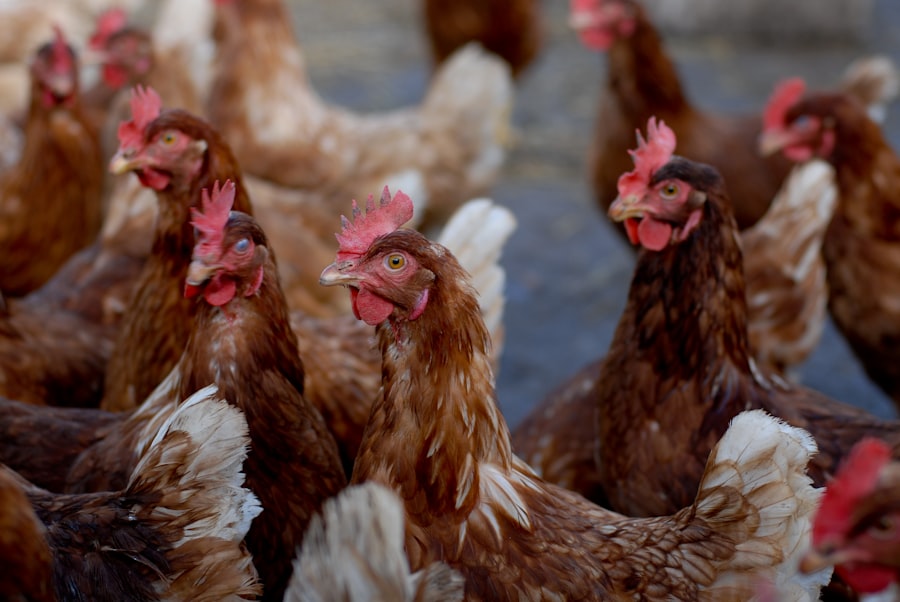Raising turkeys and chickens together has become a popular trend among backyard farmers in recent years. This practice involves keeping both poultry species in the same flock, allowing them to coexist and interact with each other. While traditionally, turkeys and chickens were raised separately due to their different needs and behaviors, many farmers have discovered the benefits of keeping them together. This article will explore the reasons behind this trend, as well as provide insights into the care and management of mixed flocks.
Key Takeaways
- Raising turkeys and chickens together can be beneficial for small-scale farmers and homesteaders.
- Turkeys and chickens have different needs and behaviors, so it’s important to understand their differences before keeping them together.
- Benefits of keeping turkeys and chickens together include pest control, socialization, and increased egg and meat production.
- Challenges of raising turkeys and chickens together include potential health concerns, aggression, and space requirements.
- Choosing the right breeds for your mixed flock is crucial for their overall health and productivity.
Understanding the Differences Between Turkeys and Chickens
Turkeys and chickens have distinct physical and behavioral differences that set them apart. In terms of appearance, turkeys are larger and have longer legs and necks compared to chickens. They also have a different feather pattern, with males displaying vibrant colors and distinctive plumage during mating season. Chickens, on the other hand, come in a variety of breeds with different sizes, shapes, and feather patterns.
In terms of behavior, turkeys are known to be more curious and adventurous than chickens. They are also more prone to flying and roosting in trees, while chickens prefer to stay on the ground. Turkeys are social animals that form strong bonds with their flock mates, while chickens tend to be more independent. These differences in behavior can affect their care and management when kept together.
Benefits of Keeping Turkeys and Chickens Together
Keeping turkeys and chickens together can provide mutual benefits for both species. One of the main advantages is pest control. Turkeys are excellent foragers and have a keen eye for spotting insects, making them effective at reducing pest populations in the area. Chickens also contribute to pest control by eating insects and scratching the ground, which helps to expose pests hiding in the soil.
Another benefit is foraging efficiency. Turkeys have a wider range of foraging skills compared to chickens. They are able to find food in a larger area and can even eat certain plants that chickens cannot digest. By keeping turkeys and chickens together, farmers can maximize the use of their land and ensure that all available resources are utilized.
Socialization is also an important aspect of keeping turkeys and chickens together. Turkeys are highly social animals that thrive in the company of others. By introducing chickens into the flock, turkeys have the opportunity to interact and socialize with a different species. This can help reduce stress and improve overall well-being for both turkeys and chickens.
Challenges of Raising Turkeys and Chickens Together
While there are many benefits to raising turkeys and chickens together, there are also potential challenges that need to be addressed. One challenge is the risk of disease transmission between the two species. Turkeys and chickens can be susceptible to different diseases, and mixing them together increases the chances of spreading infections. It is important to implement biosecurity measures to minimize the risk of disease transmission, such as keeping the flock clean, providing separate feeding and watering areas, and quarantining new birds before introducing them to the flock.
Another challenge is managing social dynamics within the mixed flock. Turkeys and chickens have different social structures and behaviors, which can lead to conflicts or dominance issues. It is important to provide enough space and resources for both species to minimize competition and aggression. Observing their interactions closely and making adjustments as needed can help maintain a harmonious flock.
Choosing the Right Breeds for Your Flock
When creating a mixed flock of turkeys and chickens, it is important to consider the breeds that will be compatible with each other. Factors to consider include size, temperament, and adaptability to different climates. For beginners, it is recommended to choose breeds that are known for their docile nature and ease of care. Some popular choices for mixed flocks include heritage breeds such as the Rhode Island Red chicken and the Bourbon Red turkey.
Experienced farmers may opt for more specialized breeds that are known for their specific traits or characteristics. For example, the Broad Breasted Bronze turkey is a popular choice for its large size and flavorful meat. The Sussex chicken breed is known for its hardiness and ability to adapt to different climates. It is important to research and choose breeds that will thrive in your specific environment and meet your desired goals for the flock.
Housing and Space Requirements for Turkeys and Chickens

When it comes to housing a mixed flock of turkeys and chickens, there are several options to consider. One option is to provide separate housing for each species, with individual coops or shelters. This allows for better control of their environment and reduces the risk of disease transmission. However, it requires more space and resources.
Another option is to provide a shared housing arrangement, where both turkeys and chickens can coexist in the same coop or shelter. This requires careful planning to ensure that there is enough space for both species to move around comfortably. It is important to provide separate roosting areas, nesting boxes, and feeding stations to minimize competition and aggression.
In terms of space requirements, turkeys generally require more space compared to chickens due to their larger size and need for exercise. A general guideline is to provide at least 10 square feet of space per turkey, and 4 square feet per chicken. However, these numbers can vary depending on the breed and individual needs of the birds. It is important to observe their behavior and make adjustments as needed to ensure they have enough space to move around freely.
Creating a safe and comfortable living environment is essential for both turkeys and chickens. This includes providing adequate ventilation, protection from predators, and access to fresh water and nutritious feed. Regular cleaning and maintenance of the coop or shelter is also important to prevent the buildup of waste and reduce the risk of disease.
Feeding and Nutrition for Mixed Flocks
Feeding a mixed flock of turkeys and chickens requires careful consideration of their nutritional needs. Turkeys have different dietary requirements compared to chickens, and it is important to provide a balanced diet for both species.
Turkeys require a higher protein content in their diet compared to chickens, especially during the growing phase. A commercial turkey feed with a protein content of around 24-28% is recommended for young turkeys. As they mature, the protein content can be reduced to around 18-20%. It is important to provide a balanced diet that includes grains, legumes, and other sources of protein.
Chickens have lower protein requirements compared to turkeys, with a recommended protein content of around 16-18% for laying hens and 20-22% for growing chicks. A commercial chicken feed that meets these requirements can be supplemented with kitchen scraps, insects, and greens to provide a varied diet.
It is important to prevent nutrient deficiencies and imbalances in the flock by providing access to fresh water and a balanced diet. Regularly monitoring their body condition and adjusting their feed as needed can help ensure that they are receiving the necessary nutrients for optimal health and productivity.
Health Concerns and Disease Prevention
Keeping a mixed flock of turkeys and chickens comes with its own set of health concerns and disease prevention measures. Both species can be susceptible to various diseases, including respiratory infections, parasites, and viral infections.
To prevent disease transmission, it is important to implement biosecurity measures. This includes keeping the flock clean and free from waste buildup, providing separate feeding and watering areas for turkeys and chickens, and quarantining new birds before introducing them to the flock. Regularly monitoring the flock for signs of illness, such as changes in behavior or appearance, can help identify potential health issues early on.
In terms of disease prevention, vaccination is an important tool for protecting the flock against common poultry diseases. Consult with a veterinarian or poultry specialist to determine the appropriate vaccination schedule for your mixed flock. It is also important to practice good hygiene and sanitation practices, such as regularly cleaning and disinfecting the coop or shelter, and providing clean bedding materials.
Behavioral Interactions Between Turkeys and Chickens
Turkeys and chickens have different social behaviors and interactions with each other. Turkeys are highly social animals that form strong bonds with their flock mates. They communicate through vocalizations and body language, and establish a pecking order within the flock. Chickens, on the other hand, tend to be more independent and establish their own hierarchy within the flock.
When introducing turkeys and chickens into a mixed flock, it is important to observe their interactions closely. Some turkeys may display dominant behaviors towards chickens, such as pecking or chasing. In some cases, chickens may also display aggressive behaviors towards turkeys. It is important to provide enough space and resources for both species to minimize competition and aggression.
Managing social dynamics in a mixed flock can be challenging, but there are strategies that can help maintain a harmonious environment. Providing multiple feeding stations and watering areas can help reduce competition for resources. Ensuring that there are enough roosting areas and nesting boxes for both species can also help minimize conflicts. If necessary, separating individuals that are displaying aggressive behaviors can help prevent injuries and maintain a peaceful flock.
Is Keeping Turkeys and Chickens Together Right for You?
In conclusion, raising turkeys and chickens together can be a rewarding experience for backyard farmers. The mutual benefits of pest control, foraging efficiency, and socialization make it an attractive option for those looking to maximize the use of their land and resources.
However, it is important to consider the challenges that come with mixing different poultry species. Disease transmission and managing social dynamics within the flock require careful planning and implementation of biosecurity measures. Choosing the right breeds, providing adequate housing and space, and ensuring a balanced diet are also important factors to consider.
Before starting a mixed flock of turkeys and chickens, it is recommended to research and consult with experienced farmers or poultry specialists. They can provide valuable insights and guidance based on their own experiences. With proper care and management, a mixed flock can thrive and provide a fulfilling experience for aspiring backyard farmers.
If you’re interested in keeping turkeys with chickens, you may also want to check out this informative article on Poultry Wizard: “Can Geese Eat Chicken Feed?” This article explores the compatibility of geese and chickens when it comes to their dietary needs. It provides valuable insights into whether geese can safely consume chicken feed and offers tips on how to manage their feeding habits. To learn more, click here: Can Geese Eat Chicken Feed?
FAQs
Can turkeys and chickens be kept together?
Yes, turkeys and chickens can be kept together in the same coop or pen.
Do turkeys and chickens get along?
Turkeys and chickens can get along, but it depends on the individual birds and their personalities. Some turkeys may be aggressive towards chickens, while others may be more docile.
What are the benefits of keeping turkeys and chickens together?
Keeping turkeys and chickens together can provide companionship for both species and can also help with pest control in the coop or pen.
What are the potential problems of keeping turkeys and chickens together?
Turkeys are larger and stronger than chickens, so they may accidentally injure or kill a chicken. Additionally, turkeys may require different feed and housing requirements than chickens.
What should be considered when keeping turkeys and chickens together?
When keeping turkeys and chickens together, it is important to provide enough space for both species and to monitor their interactions to ensure that they are getting along. It is also important to provide appropriate feed and housing for both species.
Meet Walter, the feathered-friend fanatic of Florida! Nestled in the sunshine state, Walter struts through life with his feathered companions, clucking his way to happiness. With a coop that’s fancier than a five-star hotel, he’s the Don Juan of the chicken world. When he’s not teaching his hens to do the cha-cha, you’ll find him in a heated debate with his prized rooster, Sir Clucks-a-Lot. Walter’s poultry passion is no yolk; he’s the sunny-side-up guy you never knew you needed in your flock of friends!







